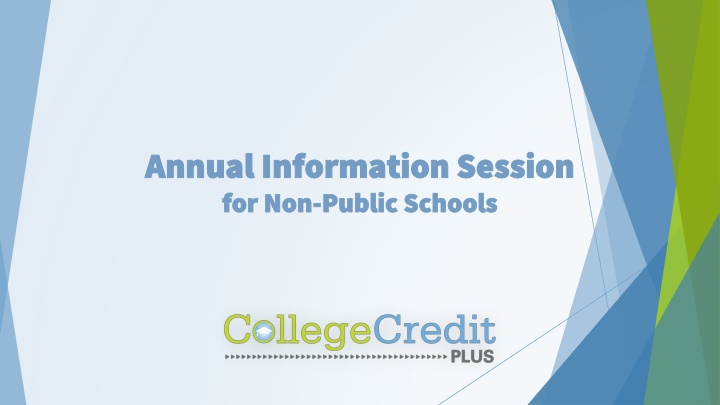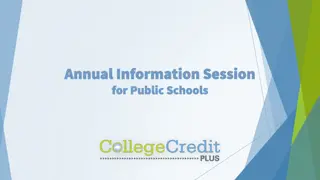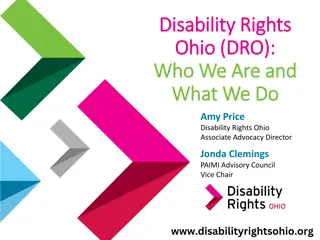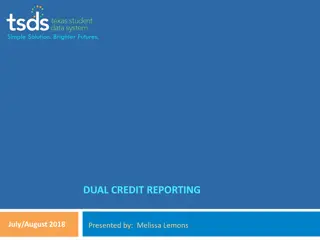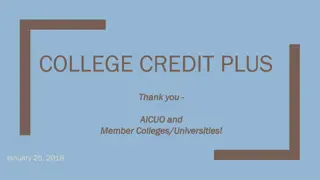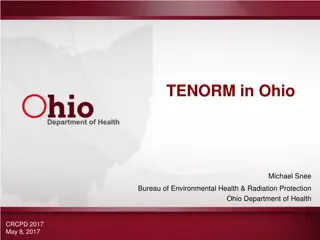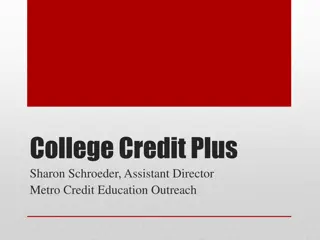Guide to College Credit Plus Program for Ohio Students
College Credit Plus is a dual credit program in Ohio that allows students in grades 7-12 to earn high school and college credit simultaneously. This guide outlines eligibility criteria, steps for participation including college admission and funding applications, and provides essential information for students interested in the program.
Download Presentation

Please find below an Image/Link to download the presentation.
The content on the website is provided AS IS for your information and personal use only. It may not be sold, licensed, or shared on other websites without obtaining consent from the author.If you encounter any issues during the download, it is possible that the publisher has removed the file from their server.
You are allowed to download the files provided on this website for personal or commercial use, subject to the condition that they are used lawfully. All files are the property of their respective owners.
The content on the website is provided AS IS for your information and personal use only. It may not be sold, licensed, or shared on other websites without obtaining consent from the author.
E N D
Presentation Transcript
Annual Information Session Annual Information Session for Non for Non- -Public Schools Public Schools
What is College Credit Plus? What is College Credit Plus? College Credit Plus is Ohio s dual credit program Students can earn high school and college credit at the same time Ohio residents in grades 7-12; enrolled at a public/private high school or homeschooled Take a variety of courses at any public and participating private college in Ohio Courses held at the high school, on a college campus, or online ORC 3365.02, ORC 3365.03
How can students participate? How can students participate? Step 1: Eligibility A student is eligible for the College Credit Plus program if the student meets any of the following criteria: Obtains a remediation-free score on one of the standard assessment exams Has a cumulative unweighted high school grade point average of at least 3.00 Has a cumulative unweighted high school grade point average of at least 2.75 but less than 3.00 and received an "A" or "B" grade in a relevant high school course. ORC 3365.03, OAC 3333-1-65.14
How can students participate? How can students participate? Step 2: College Admission Students must apply for admission at each institution Admission is reviewed per the requirements of the college or university; contact the college to find specific information College applications include the permission slip for mature content and a questionnaire about emotional maturity Colleges have the final decision on student admission ORC 3365.05, 3365.035, OAC 3333-1-65.3
How can students participate? How can students participate? Step 3: Funding Application Families must apply for CCP state funding each year To apply: A parent or guardian must establish an OH|ID to file the CCP Funding Application The application includes a college acceptance letter Parents apply for a number of Credit Hours depending on how many courses the student would like to take ORC 3365.07, OAC 3333-1-65.8
How can students participate? How can students participate? Step 3: Funding Application State Funds are awarded approximately five weeks after the deadline Funds are limited; students may not be awarded all their requested credit hours Funding awards are distributed based on student grade level Funds can not be split all of a course s credit hours must be covered ORC 3365.07, OAC 3333-1-65.8
How can students participate? How can students participate? Step 3: Funding Application If awarded funds do not cover the total cost of a course, families may choose to pay for the entire course This is considered Option A a self pay option described later in the presentation The application opens February 1 and the deadline is April 1 at 5:00 p.m. annually ORC 3365.07, OAC 3333-1-65.8
How can students participate? How can students participate? Step 4: Course Registration The college will discuss course options with the student, based on assessment scores, prerequisites, and other requirements School counselors can help students understand graduation requirements and CCP course substitutions High schools and colleges develop 15 and 30 credit hour pathways to help you determine your plan ORC 3365.13
Course Eligibility Rules Course Eligibility Rules Students must complete their first 15 credits in Level I courses, which include: Transferable courses Courses in IT, Computer Science, Anatomy & Physiology, foreign language Courses that are part of a technical certificate Courses that are part of a 15- or 30-credit pathway Courses in study skills, academic or career success OAC 3333-1-65.12, ORC 3365.13
Course Eligibility Rules Course Eligibility Rules Non-allowable courses include: Private applied courses with one-on-one instruction (such as performing art lessons) Courses with high fees Study abroad courses Physical education courses Pass/Fail graded courses Remedial courses or sectarian/religious courses OAC 3333-1-65.12, ORC 3365.13
How many classes can students take? Students may be enrolled in up to 30 credits per year, which includes high school courses: Calculation: 30 (HS units x 3) = max CCP credit hours The maximum number of college credits a student can complete while participating in the program is 120 If a student enrolls in more than 30 credits for the year, they can: Drop the course prior to the no-fault withdrawal date Pay for the entire course at the college s standard rates (Option A) OAC 3333-1-65.12, ORC 3365.13
Additional Considerations Additional Considerations Grades The final grades earned in the college course are the same grade that will be on the high school transcript CCP course grades will be factored into the high school and college GPAs Grade Weighting High schools must weight all advanced standing courses in a subject area consistently(CCP, AP, IB, Honors) ORC 3365.12, OAC 3333-1-65.2
Additional Considerations Additional Considerations Selective Service Male students who are at least 18 years of age and Ohio residents are required to be registered with the Selective Service System Students are required to provide their Selective Service number to the public college or university within 30 days of their 18th birthday Failure submit the Selective Service number will result in the student not being considered a College Credit Plus participant for that semester or term The student will be responsible for any tuition, textbooks, or fees associated with the course(s) ORC 3345.32
What are differences between high school & college? What are differences between high school & college? High School College Required homework ranges between 1-3 hours per day 2-3 hours of studying/reading for each hour of class Study Time Information provided mostly in class, assignments to follow what was covered Knowledge Acquisition Out-of-class work in advance of in-class discussion Given weekly or at the end of each unit Less frequent and cover more material Tests
What are differences between high school & college? What are differences between high school & college? High School College Numerous quizzes, tests, homework assignments, etc. Fewer tests and few homework assignments Student has more responsibility; guardians more of a mentor/support Students must work directly with college staff to determine if accommodations are needed; IEPs and 504 plans may or may not be included in the discussions Grades Role of Guardians advocate, involved and work with teachers & counselors Parents/Guardians Parents and students work with high school staff to determine what assistance or accommodations can be made for students with IEPs or 504 plans Accommodations
What does it mean to be college What does it mean to be college- -ready ? ready ? Being college-ready is more than just being academically ready Consider emotional and social transition and college expectations Consider time management and organizational skills
What are benefits of participating in What are benefits of participating in College Credit Plus? College Credit Plus? Students can: Earn high school and college credits at the same time Get a head start on career planning and earn degrees or certificate completions Experience college early to understand the expectations of college life Save tuition and textbook costs
What are the consequences of What are the consequences of underperforming? underperforming? Families may be asked to reimburse courses if: The student does not earn a passing grade in their course The student withdraws after the no-fault deadline at the college NOTE: A student that is considered economically disadvantaged can not be asked to reimburse the cost of the course(s) ORC 3365.09, 3365.091; OAC 3333-1-65.13
What are the consequences of What are the consequences of underperforming? underperforming? College Credit Plus Probation A student will be placed on CCP probation if: They earn less than a cumulative 2.0 GPA in CCP courses or They withdraw from 2 or more courses in one academic term ORC 3365.09, 3365.091; OAC 3333-1-65.13
What are the consequences of What are the consequences of underperforming? underperforming? While on CCP Probation, the student: May only enroll in one College Credit Plus course for one college term (semester or quarter) May not enroll in a college course in the same subject in which student previously earned D, F, NC grade (or equivalent grade) If students on CCP probation do not increase their CCP GPA to a 2.0 or above during the probation term, they will be placed on CCP Dismissal ORC 3365.09, 3365.091; OAC 3333-1-65.13
What are the consequences of What are the consequences of underperforming? underperforming? College Credit Plus Dismissal If a student does not raise their grade during the probation term, they are dismissed from CCP While on CCP Dismissal, students may not enroll in any College Credit Plus courses A student can request (appeal) to be reinstated in the program ORC 3365.09, 3365.091; OAC 3333-1-65.13
What are the consequences of What are the consequences of underperforming? underperforming? Appeals for Underperformance: CCP Probation: Student may appeal to take a course in the same subject in which they previously earned a non-passing grade or received no credit CCP Dismissal: Within 5 days of being dismissed, the student may submit an appeal to the secondary school to appeal CCP Dismissal or the student may appeal at the end of the CCP Dismissal semester Note: Each school district must have a policy describing the process for appeals ORC 3365.09, 3365.091; OAC 3333-1-65.13
What are the consequences of What are the consequences of underperforming? underperforming? After HS Graduation: Grades earned in CCP will remain on students college transcripts permanently If students fail or withdraw often, future financial aid may be also impacted negatively Satisfactory Academic Progress (SAP) is a requirement for financial aid Standards vary by institution ORC 3365.09, 3365.091; OAC 3333-1-65.13
What are the expenses for College Credit What are the expenses for College Credit Plus? Plus? Option A: The family/student can choose to self-pay for college courses at the standard rate of tuition, fees, and textbooks Students/families should arrange a plan for payment with the college or university Students can choose to earn college credit and high school credit OR only college credit Students must inform the school of their choice of credit for courses ORC 3365.06
What are the expenses for College Credit What are the expenses for College Credit Plus? Plus? Option B: The default or standard option for College Credit Plus All college course tuition, fees, and textbooks will be paid by the state of Ohio Supported by the school s foundation funds and the college s funds Students will earn college credit and high school credit ORC 3365.06
What are support services are available What are support services are available for students? for students? Students receive support from both the HS and College: High school counselors continue to provide assistance to all College Credit Plus students College advisors provide course selection assistance Colleges must provide the same academic supports to CCP students such as tutoring, library access, advising, etc.
What about athletic eligibility? What about athletic eligibility? Student athletes should: Learn the Ohio High School Athletic Association (OHSAA) requirements Know that summer term CCP courses cannot be used to bring a student into compliance with the OHSAA requirements for interscholastic athletic participation
Will the course credits transfer? Will the course credits transfer? Certain general education and technical courses will transfer, especially from one Ohio public college to another Ohio public college Students must check with colleges to confirm transferability Students should also visit https://transfercredit.ohio.gov for transfer information
What are the deadlines? What are the deadlines? Funding Application/Intent to Participate March 15: Recommended deadline for first-time parent/guardians to create OH|ID account April 1: Submit funding application and required documents by 5p.m. Check ACT and SAT testing dates Test early to meet college/university admission deadlines (if required) Semester deadlines Summer semester deadline will be early as classes usually start in May Check with the college for all other semester deadlines
Next Steps Next Steps Contact the college and discuss assessment testing requirements Apply for admission at the college of choice by the deadline Complete the Funding Application/Intent to Participate form and provide to the school office by April 1 Meet with your school counselor to discuss scheduling and graduation requirements
Do you have other questions? Do you have other questions? Visit the CCP website for additional resources: https://highered.ohio.gov/initiatives/access- acceleration/college-credit-plus/ccp Follow up with the ODHE CCP Team: CCP@highered.ohio.gov
SCHOOLS MAY ADD SLIDES HERE SCHOOLS MAY ADD SLIDES HERE Add information here
